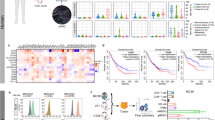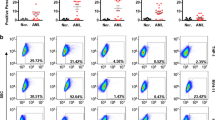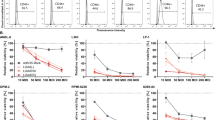Abstract
Conditionally replicating adenoviruses (CRAds) represent a promising new platform for anticancer therapy. However, CRAds have been evaluated little in hematopoietic malignancies because of the lack of expression of coxsackie adenovirus receptor (CAR) on their cell surface. In this study, we showed that CAR was expressed on two types of lymphoblastic leukemia cell lines and primary leukemia cells, and that ZD55, a CRAd, exerted a potent antileukemia effect in vitro and in vivo. Furthermore, ZD55 expressing melanoma differentiation-associated gene-7/interleukin-24 (ZD55-IL-24) elicited significant enhanced antileukemia activity comparing with ZD55, concomitant with upregulation of RNA-dependent protein kinase R (PKR), increased phosphorylation of p38 mitogen-activated protein kinase (MAPK), and induction of endoplasmic reticulum (ER) stress. These data for the first time indicate that MDA-7/IL-24 exerts its antitumor effect on leukemia cells via multiple pathways, and suggest that oncolytic adenoviruses, ZD55 and ZD55-IL-24 could potentially be used against CAR-expressing hematological malignancies such as B-lymphoblastic leukemia/lymphoma and some myeloid leukemia.
This is a preview of subscription content, access via your institution
Access options
Subscribe to this journal
Receive 12 print issues and online access
$259.00 per year
only $21.58 per issue
Buy this article
- Purchase on Springer Link
- Instant access to full article PDF
Prices may be subject to local taxes which are calculated during checkout






Similar content being viewed by others
References
Kirn D, Martuza RL, Zwiebel J . Replication-selective virotherapy for cancer: biological principles, risk management and future directions. Nat Med 2001; 7: 781–787.
Bischoff JR, Kirn DH, Williams A, Heise C, Horn S, Muna M et al. An adenovirus mutant that replicates selectively in p53-deficient human tumor cells. Science 1996; 274: 373–376.
Nemunaitis J, Khuri F, Ganly I, Arseneau J, Posner M, Vokes E et al. Phase II trial of intratumoral administration of ONYX-015, a replication selective adenovirus, in patients with refractory head and neck cancer. J Clin Oncol 2001; 19: 289–298.
Reid T, Galanis E, Abbruzzese J, Sze D, Andrews J, Romel L et al. Intra-arterial administration of a replication-selective adenovirus (dl1520) in patients with colorectal carcinoma metastatic to the liver: a phase I trial. Gene Therapy 2001; 8: 1618–1626.
Reid T, Galanis E, Abbruzzese J, Sze D, Wein LM, Andrews J et al. Hepatic arterial infusion of a replication-selective oncolytic adenovirus (dl1520): phase II viral, immunologic, and clinical endpoints. Cancer Res 2002; 62: 6070–6079.
Makower D, Rozenblit A, Kaufman H, Edelman M, Lane ME, Zwiebel J et al. Phase II clinical trial of intralesional administration of the oncolytic adenovirus ONYX-015 in patients with hepatobiliary tumors with correlative p53 studies. Clin Cancer Res 2003; 9: 693–702.
Mulvihill S, Warren R, Venook A, Adler A, Randlev B, Heise C et al. Safety and feasibility of injection with an E1B-55 kDa gene-deleted, replication-selective adenovirus (ONYX-015) into primary carcinomas of the pancreas: a phase I trial. Gene Therapy 2001; 8: 308–315.
Vasey PA, Shulman LN, Campos S, Davis J, Gore M, Johnston S et al. Phase I trial of intraperitoneal injection of the E1B-55-kd-gene-deleted adenovirus ONYX-015 (dl1520) given on days 1 through 5 every 3 weeks in patients with recurrent/refractory epithelial ovarian cancer. J Clin Oncol 2002; 20: 1562–1569.
Nemunaitis J, Cunningham C, Buchanan A, Bluckburn A, Edelman G, Maples P et al. Intravenous infusion of a replication-selective adenovirus (ONYX-015) in cancer patients: safety, feasibility and biological activity. Gene Therapy 2001; 8: 746–759.
Liu X, Qiu S, Zou W, Pei Z, Gu J, Luo C et al. Effective gene-virotherapy for complete eradication of tumor mediated by the combination of hTRAIL (TNFsF10) and plasminogen k5. Mol Ther 2005; 11: 531–541.
Zhang Z, Zou W, Luo C, Li B, Wang J, Sun L et al. An armed oncolytic adenovirus system, ZD55-gene, demonstrating potent antitumoral efficacy. Cell Res 2003; 13: 481–489.
Pei Z, Chu L, Zou W, Zhang Z, Qiu S, Qi R et al. An oncolytic adenoviral vector of Smac increases antitumor activity of TRAIL against HCC in human cells and in mice. Hepatology 2004; 39: 1371–1381.
Zhao L, Gu J, Dong A, Zhang Y, Zhong L, He Y et al. Potent antitumor activity of oncolytic adenovirus expressing mda-7/IL-24 for colorectal cancer. Hum Gene Ther 2005; 16: 845–858.
Fisher PB . Is mda7/IL24 a ‘magic bullet’ for cancer? Cancer Res 2005; 65: 10128–10138.
Su ZZ, Madireddi MT, Lin JJ, Young CS, Kitada S, Reed JC et al. The cancer growth suppressor gene mda-7 selectively induces apoptosis in human breast cancer cells and inhibits tumor growth in nude mice. Proc Natl Acad Sci USA 1998; 95: 14400–14405.
Gopalan B, Shanker M, Chada S, Ramesh R . MDA-7/IL-24 suppresses human ovarian carcinoma growth in vitro and in vivo. Mol Cancer 2007; 6: 11.
Saeki T, Mhashilkar A, Chada S, Branch C, Roth JA, Ramesh R . Tumor suppressive effects by adenovirus-mediated mda-7 gene transfer in nonsmall cell lung cancer in vitro. Gene Therapy 2000; 7: 2051–2057.
Saeki T, Mhashilkar A, Swanson X, Zou-Yang X, Sieqer K, Kawabe S et al. Inhibition of human lung cancer growth following adenovirus mediated mda-7 gene expression in vivo. Oncogene 2002; 21: 4558–4566.
Zhao L, Dong A, Gu J, Liu Z, Zhang Y, Zhang W et al. The antitumor activity of TRAIL and IL-24 with replicating oncolytic adenovirus in colorectal cancer. Cancer Gene Ther 2006; 13: 1011–1022.
Cunningham CC, Chada S, Merritt JA, Tong A, Senzer N, Zhang Y et al. Clinical and local biological effects of an intratumoral injection of mda-7 (IL24; INGN 241) in patients with advanced carcinoma: a phase I study. Mol Ther 2005; 11: 149–159.
Tong AW, Nemunaitis J, Su D, Zhang Y, Cunningham C, Senzer N et al. Intratumoral injection of INGN 241, a nonreplicating adenovector expressing the melanoma-differentiation associated gene-7 (mda-7/IL24): biologic outcome in advanced cancer patients. Mol Ther 2005; 11: 160–172.
Pataer A, Vorburger SA, Barber GN, Chada S, Mahshilkar AM, Zou-Yang H et al. Adenoviral transfer of the melanoma differentiation-associated gene 7 (mad7) induces apoptosis of lung cancer cells via up-regulation of the double-stranded RNA-dependent protein kinase (PKR). Cancer Res 2002; 62: 2239–2243.
Sarkar D, Su ZZ, Lebedeva IV, Sauane M, Gopalkrishnan RV, Valerie K et al. Mda-7 (IL-24) mediates selective apoptosis in human melanoma cells by inducing the coordinated overexpression of the GADD family of genes by means of p38 MAPK. Proc Natl Acad Sci USA 2002; 99: 10054–10059.
Mhashilkar AM, Schrock RD, Hindi M, Liao J, Sieqer K, Kourouma F et al. Melanoma-differentiation associated gene-7 (mda-7): a novel anti-tumor gene for cancer gene therapy. Mol Med 2001; 7: 271–282.
Douglas JT, Kim M, Sumerel LA, Carey DE, Curiel DT . Efficient oncolysis by a replicating adenovirus (ad) in vivo is critically dependent on tumor expression of primary ad receptors. Cancer Res 2001; 61: 813–817.
Wickham TJ, Mathias P, Cheresh DA, Nemerow GR . Interins αvβ3 and αvβ5 promote adenovirus internalization but not virus attachment. Cell 1993; 73: 309–319.
Mentel R, Dopping G, Wegner U, Seidel W, Liebermann H, Dohner L . Adenovirus-receptor interaction with human lymphocytes. J Med Virol 1997; 51: 252–257.
Rebel VI, Hartnett S, Denham J, Chan M, Finberg R, Sieff CA . Maturation and lineage-specific expression of the coxsackie and adenovirus receptor in hematopoietic cells. Stem cells 2000; 18: 176–182.
Li Y, Pong RC, Bergelson JM, Hall MC, Sagalowsky AI, Tseng CP et al. Loss of adenoviral receptor expression in human bladder cancer cells: a potential impact on the efficacy of gene therapy. Cancer Res 1999; 59: 325–330.
Hemmi S, Geertsen R, Mezzacasa A, Peter I, Dummer R . The presence of human coxsackie virus and adenovirus receptor is associated with efficient adenovirus-mediated transgene expression in human melanoma cell cultures. Hum Gene Ther 1998; 9: 2363–2373.
Rao Q, Zhang G, Lin Y, Wu K . Production of matrix metalloproteinase-9 by cord blood CD34+ cells and its role in migration. Ann Hematol 2004; 83: 409–413.
Qian W, Liu J, Jin J, Ni W, Xu W . Arsenic trioxide induces not only apoptosis but also autophagic cell death in leukemia cell lines via up-regulation of Beclin-1. Leuk Res 2007; 31: 329–339.
Sauane M, Lebedeva IV, Su ZZ, Choo HT, Randolph A, Valerie K et al. Melanoma differentiation associated gene-7/interleukin-24 promotes tumor cell-specific apoptosis through both secretory and nonsecretory pathways. Cancer Res 2004; 64: 2988–2993.
Sieger KA, Mhashilkar AM, Stewart A, Sutton RB, Strube RW, Chen SY et al. The tumor suppressor activity of MDA-7/IL-24 is mediated by intracellular protein expression in NSCLC cells. Mol Ther 2004; 9: 355–367.
Gopalan B, Litvak A, Sharma S, Mhashilkar AM, Chada S, Ramesh R . Activation of the Fas–FasL signaling pathway by MDA-7/IL-24 kills human ovarian cancer cells. Cancer Res 2005; 65: 3017–3024.
Peng KW, Donovan KA, Schneider U, Cattaneo R, Lust JA, Russell SJ . Oncolytic measles viruses displaying a single-chain antibody against CD38, a myeloma cell marker. Blood 2003; 101: 2557–2562.
Suter SE, Chein MB, von Messling V, Yip B, Cattaneo R, Vernau W et al. In vitro canine distemper virus infection of canine lymphoid cells: a prelude to oncolytic therapy for lymphoma. Clin Cancer Res 2005; 11: 1579–1587.
Mentel R, Dopping G, Wegner U, Seidel W, Lieber-mann H, Dohner L . Adenovirus-receptor interaction with human lymphocytes. J Med Virol 1997; 51: 252–257.
Medina D, Sheay W, Goodell L, Kidd P, White E, Rabson AB et al. Adenovirus mediated cytotoxicity of chronic lymphocytic leukemia cells. Blood 1999; 94: 3499–3508.
Wang Y, Xue A, Hallden G, Francis F, Yuan M, Griffin BE et al. Virus-associated RNA I-deleted adenovirus, a potential oncolytic agent targeting EBV-associated tumors. Cancer Res 2005; 65: 1523–1531.
Rivera AA, Davydova J, Schierer S, Wang M, Krasnykh V, Yamamoto M et al. Combining high selectivity of replication with fiber chimerism for effective adenoviral oncolysis of CAR-negative melanoma cells. Gene Therapy 2004; 11: 1694–1702.
Yotnda P, Zompeta C, Heslop HE, Andreeff M, Brenner MK, Marini F . Comparison of the efficiency of transduction of leukemic cells by fiber-modified adenoviruses. Hum Gene Ther 2004; 15: 1229–1242.
Chen L, Pulsipher M, Chen D, Sieff C, Elias A, Fine HA et al. Selective transgene expression for detection and elimination of contaminating carcinoma cells in hematopoietic stem cell sources. J Clin Invest 1996; 98: 2539–2548.
Dix BR, Edwards SJ, Braithwaite AW . Dose the antitumor adenovirus ONXY-015/dll1520 selectively target cells defective in the p53 pathway? J Virol 2001; 75: 5443–5447.
Gupta P, Su ZZ, Lebedeva IV, Sarkar D, Sauane M, Emdad L et al. mda-7/IL-24: multifunctional cancer-specific apoptosis-inducing cytokine. Pharmacol Ther 2006; 111: 596–628.
Mhashilkar AM, Stewart AL, Sieger K, Yang HY, Khimani AH, Ito I et al. MDA-7 negatively regulates the beta-catenin and PI3K signaling pathways in breast and lung tumor cells. Mol Ther 2003; 8: 207–219.
Lebedeva IV, Sarkar D, Su ZZ, Kitada S, Dent P, Stein CA et al. Bcl-2 and Bcl-x(L) differentially protect human prostate cancer cells from induction of apoptosis by melanoma differentiation associated gene-7, mda-7/IL-24. Oncogene 2003; 22: 8758–8773.
Yacoub A, Mitchell C, Lister A, Lebedeva IV, Sarkar D, Su ZZ et al. Melanoma differentiation-associated 7 (interleukin 24) inhibits growth and enhances radiosensitivity of glioma cells in vitro and in vivo. Clin Cancer Res 2003; 9: 3272–3281.
Gupta P, Walter MR, Su ZZ, Lebedeva IV, Emdad L, Randolph A et al. BiP/GRP78 is an intracellular target for MDA-7/IL-24 induction of cancer-specific apoptosis. Cancer Res 2006; 66: 8182–8191.
Acknowledgements
This work was supported by National Natural Science Foundation of China grants 30470745 (W Qian); 30600257 (Y Tong, W Qian); the Key Social Development Project of Zhejiang Province grants 2004c23005 (W Qian); Chinese National ‘973’ Project Foundation grants 2003AA216031, 2002AA216021 and Natural Science Foundation of China grants 30120160823 (X Liu). We thank L Wang for her help with electron microscope.
Author information
Authors and Affiliations
Corresponding author
Rights and permissions
About this article
Cite this article
Qian, W., Liu, J., Tong, Y. et al. Enhanced antitumor activity by a selective conditionally replicating adenovirus combining with MDA-7/interleukin-24 for B-lymphoblastic leukemia via induction of apoptosis. Leukemia 22, 361–369 (2008). https://doi.org/10.1038/sj.leu.2405034
Received:
Revised:
Accepted:
Published:
Issue Date:
DOI: https://doi.org/10.1038/sj.leu.2405034
Keywords
This article is cited by
-
CD19-targeted BiTE expression by an oncolytic vaccinia virus significantly augments therapeutic efficacy against B-cell lymphoma
Blood Cancer Journal (2022)
-
Enhanced anti-melanoma efficacy through a combination of the armed oncolytic adenovirus ZD55-IL-24 and immune checkpoint blockade in B16-bearing immunocompetent mouse model
Cancer Immunology, Immunotherapy (2021)
-
Enhancing the antitumor activity of an engineered TRAIL-coated oncolytic adenovirus for treating acute myeloid leukemia
Signal Transduction and Targeted Therapy (2020)
-
The armed oncolytic adenovirus ZD55-IL-24 eradicates melanoma by turning the tumor cells from the self-state into the nonself-state besides direct killing
Cell Death & Disease (2020)
-
Apoptotic signal pathways and regulatory mechanisms of cancer cells induced by IL-24
Wuhan University Journal of Natural Sciences (2016)



